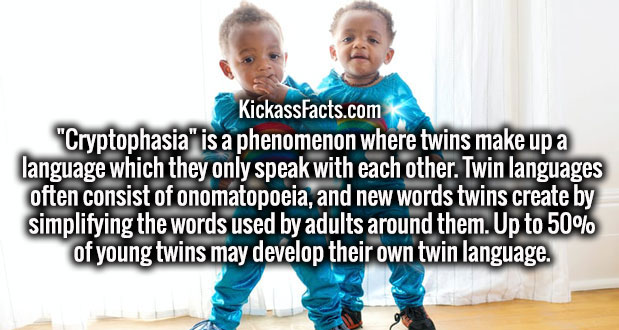Cryptophasia is a language phenomenon that only twins identical or fraternal can understand
Cryptophasia: The Mysterious Language Only Twins Can Understand

The bond between twins has always been fascinating to researchers and the general public alike. One intriguing phenomenon that has captured the interest of linguists is cryptophasia, a secret language that only twins, whether identical or fraternal, can comprehend. This unique form of communication has piqued curiosity and raised numerous questions about the depths of human language and connection.
Cryptophasia, also known as idioglossia or autonomous language, refers to a phenomenon in which twins develop their own private language. This secretive language is characterized by a distinct and often complex set of words, phrases, gestures, and even intonations. Communication through cryptophasia is typically exclusive to twins and remains unintelligible to those outside of the twin relationship.

Researchers have extensively studied cryptophasia to unravel its origins and mechanisms. Twins naturally share a strong bond from the moment they are conceived, and their closeness continues to develop throughout their lives. As a result, they often spend ample time together and are exposed to similar linguistic inputs, which can contribute to the emergence of cryptophasia.
While cryptophasia is most common among twins, it is not exclusive to them. Some isolated cases of cryptophasia have been documented between siblings or close companions who have spent an extraordinary amount of time together during early childhood. However, the phenomenon primarily manifests in twins due to their unique shared experiences and close emotional connection.
The content and structure of cryptophasia vary significantly from case to case. Some twins develop a highly elaborate and seemingly structured private language, complete with grammar rules and vocabulary. Others may communicate through simplified gestures and sounds. Despite the variance, what remains consistent is the exclusive nature of the communication, limiting understanding to the participating twins.
While cryptophasia may appear mysterious and nearly impenetrable to outsiders, researchers have made progress in decoding its underlying processes. One prevailing theory suggests that cryptophasia emerges as a result of twins’ innate need for intimacy and their desire to create a distinct identity separate from the outside world. By developing a private language, twins can establish a unique shared experience while maintaining a sense of independence.
The linguistic implications of cryptophasia have sparked debates among both scientific and linguistic communities. Some experts argue that cryptophasia may reflect the universal capacity for language acquisition and communication, while others see it as a rare, isolated phenomenon. Nevertheless, cryptophasia continues to provide valuable insights into the nature of language development and human communication.
In conclusion, cryptophasia stands as an intriguing linguistic phenomenon that sheds light on the depths of human connection. Exclusive to twins, this secret language serves as a testament to the extraordinary bond shared by these individuals. As researchers continue to unravel the mysteries of cryptophasia, it is clear that this phenomenon goes beyond ordinary communication, offering a glimpse into the unique world of twins and their language.
Source: Wikipedia - Cryptophasia
Tags
Related Posts
Quick Links
Legal Stuff